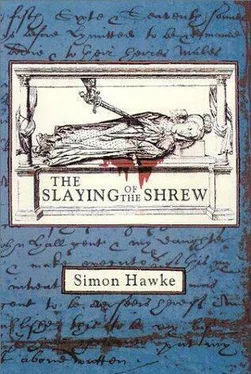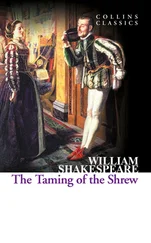Simon Hawke - The Slaying Of The Shrew
Здесь есть возможность читать онлайн «Simon Hawke - The Slaying Of The Shrew» весь текст электронной книги совершенно бесплатно (целиком полную версию без сокращений). В некоторых случаях можно слушать аудио, скачать через торрент в формате fb2 и присутствует краткое содержание. Жанр: Исторический детектив, на английском языке. Описание произведения, (предисловие) а так же отзывы посетителей доступны на портале библиотеки ЛибКат.
- Название:The Slaying Of The Shrew
- Автор:
- Жанр:
- Год:неизвестен
- ISBN:нет данных
- Рейтинг книги:5 / 5. Голосов: 1
-
Избранное:Добавить в избранное
- Отзывы:
-
Ваша оценка:
- 100
- 1
- 2
- 3
- 4
- 5
The Slaying Of The Shrew: краткое содержание, описание и аннотация
Предлагаем к чтению аннотацию, описание, краткое содержание или предисловие (зависит от того, что написал сам автор книги «The Slaying Of The Shrew»). Если вы не нашли необходимую информацию о книге — напишите в комментариях, мы постараемся отыскать её.
The Slaying Of The Shrew — читать онлайн бесплатно полную книгу (весь текст) целиком
Ниже представлен текст книги, разбитый по страницам. Система сохранения места последней прочитанной страницы, позволяет с удобством читать онлайн бесплатно книгу «The Slaying Of The Shrew», без необходимости каждый раз заново искать на чём Вы остановились. Поставьте закладку, и сможете в любой момент перейти на страницу, на которой закончили чтение.
Интервал:
Закладка:
“Aye, and he frequently did much worse,” added Kemp, whose dislike for their late colleague, who had recently quit their company for their chief rivals, the Admiral’s Men, was matched only by the legendary actor’s profound distaste for him.
The mention of Alleyn’s name momentarily broke their mood of levity, for aside from Kemp’s dislike of him, Edward Alleyn was sorely missed. He was widely acknowledged as the finest actor of the day and if Kemp considered both his talent and his ego overblown, Smythe knew it was because his feelings were motivated primarily by jealousy, for Alleyn’s was the name that drew the audiences. They were of different schools, with Alleyn being the realistic dramatist and Kemp the capering clown who played directly to the audience and ad libbed whenever the mood struck him, or whenever he could not recall his lines, which he took little trouble to memorize in any case.
Unfortunately for Kemp, Smythe thought, his brand of broad, physical comedy seemed to be going out of style, just as Shakespeare had predicted, and Kemp seemed unwilling or unable to adapt. For all his grave portentousness and showy manner, Alleyn was now drawing significantly larger audiences at the Rose Theatre, and while the Queen’s Men could still boast Her Royal Majesty as their patron, their reputation as the preeminent players of the day was on the wane. Their repertoire was somewhat shopworn and though Shakespeare had managed to improve several of their plays with rewrites, they badly needed something new to bring their audiences back. They were all too well aware of this, and the mention of Ned Alleyn’s name merely served to underscore it.
“Well, come on now, Speed, bestir yourself,” said Shakespeare, leaning down to give him a hand up. “You shall only soil your costume on these steps, aside from which, methinks I spy some boats drawing near.”
Indeed, some small boats were approaching from the direction of the city, bearing the first arrivals of the day. After some brief discussion concerning the roles they were to play, they all decided simply to welcome the arriving guests as if they were citizens of Rome, coming to attend the wedding of Caesar and Cleopatra. It was decided that it would probably be for the best to avoid any reference to Calpurnia, or Mark Antony, for that matter, and that whatever they decided to call themselves as they improvised their way through their individual performances, the names of Casca, Cassius and Brutus might be a little inappropriate.
The players were not the only ones awaiting the arriving guests at the stone gate. As the boats drew up to the stone steps that came down to the water from the arched river gate, several of the household staff stood by to check their invitations, in order to make certain that no uninvited guests would be admitted. Rather cleverly, Will Kemp took it upon himself to receive the invitations from the men who checked them and then announce the guests as if they were arriving at an imperial court. It allowed him an opportunity to ham it up in front of some of London’s most wealthy and influential citizens, while at the same time it kept him from having to keep going up and down the stairs to the house, as did all the others who escorted the arriving guests.
As the morning wore on and guests continued to arrive, Smythe remained by the gate with Kemp, playing subserviently to his character as if he were some ministerial aide and collecting all the invitations from him while paying particular attention to the noblemen who were arriving together with their grown and eligible sons. To his dismay, there turned out to be over a dozen of them. And then there were other sons of noble birth who arrived together with their fathers and their mothers, though it occurred to Smythe that he should not eliminate them from consideration simply because of that. A man who was bold enough to pose as the son of a nobleman in all this august company would certainly be resourceful enough to find a woman who could play the part of his mother, just as he had planned to have his co-conspirator pose as his wealthy, aristocratic father.
Unfortunately, thought Smythe, his background was not such that he would know any of these people. Some of their names might be familiar to him, but a lowly ostler and player such as himself did not move in such exalted circles, and so he therefore lacked the necessary knowledge to make any immediate determinations as to who was who. A good many of these people would naturally know one another, and would thus be better able to identify any strangers in their midst, but he could not simply approach noblemen and ask them to vouch for one another. Dick Burbage, perhaps, as one who had grown up in the city, would be better able to recognize many of these people, but more than anything else, Smythe wished that Sir William were here, so that he could consult with him. As a regular at court and a leader of London society, Sir William would certainly be able to help him narrow down the list of suspects.
However, in all likelihood, Sir William had accompanied the queen on her sojourn in the country, because whenever Her Majesty made her annual progresses through the countryside, her entire court would travel with her. It meant that whichever of her subjects she chose to stay with when she stopped would have to bear the expense of playing host not only to the queen, but to her entire court, as well. It would take a mansion such as Green Oaks or Middleton Manor to house them all and it would take a large retinue of servants to see to their needs. Why anyone would wish to put up with such a monumental inconvenience and expense, much less compete with others for the dubious privilege, was beyond Smythe, but compete for it they did, and this wedding festival at Middleton Manor was planned to serve that very purpose. Smythe understood, in essence, that playing for the queen’s favor was important to those who wished to rise in rank and power, but he still found it difficult to understand why any of that would mean much to Sir William.
The first time they had met, Sir William had tried to rob him. Of course, he had not known it was Sir William at the time. The last thing Smythe would have expected to encounter on a country road while on his way to London was a knight of the realm dressed as a highwayman. It was not until much later that he discovered who the infamous Black Billy really was or why one of the wealthiest and most powerful men in London chose to lead a secret life as a legendary brigand. As master of the Sea Hawks, the privateers who had achieved everlasting fame and glory when, led by Sir Francis Drake, they had defeated and wrecked the Spanish Armada, Sir William had made his fortune as a shipwright. Though not personally a privateer, he liked to think of himself as something of a pirate, and in a sense, Smythe thought, he probably was. Though he had done his buccaneering with his purse strings rather than a cutlass, William Worley had been no less ruthless.
Smythe found it difficult to imagine how a man like Sir William could indulge in the sort of social jousting practiced by men like Godfrey Middleton and most of the queen’s courtiers. It was rather like trying to imagine a hawk strutting with the chickens. It seemed both unlikely and absurd.
However, a friendship between a knight like Worley and a player like himself seemed equally unlikely and absurd, and yet despite that Sir William was his friend, though Smythe was under no illusions that they would possibly ever be equals. Aside from himself, Shakespeare was the only other person who knew that Sir William was Black Billy, at least to Smythe’s knowledge. Sir Francis Walsingham undoubtedly knew, as well, though Smythe could only surmise that. Her Majesty’s chief minister was reputedly a man of many secrets and Black Billy would be one of the best kept.
Читать дальшеИнтервал:
Закладка:
Похожие книги на «The Slaying Of The Shrew»
Представляем Вашему вниманию похожие книги на «The Slaying Of The Shrew» списком для выбора. Мы отобрали схожую по названию и смыслу литературу в надежде предоставить читателям больше вариантов отыскать новые, интересные, ещё непрочитанные произведения.
Обсуждение, отзывы о книге «The Slaying Of The Shrew» и просто собственные мнения читателей. Оставьте ваши комментарии, напишите, что Вы думаете о произведении, его смысле или главных героях. Укажите что конкретно понравилось, а что нет, и почему Вы так считаете.












